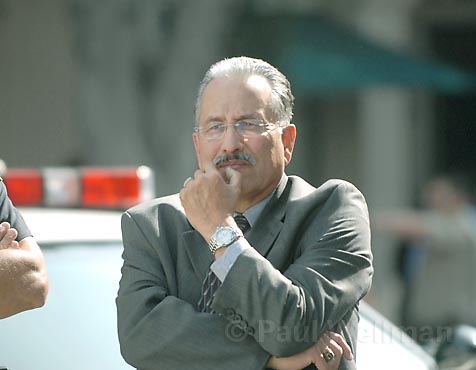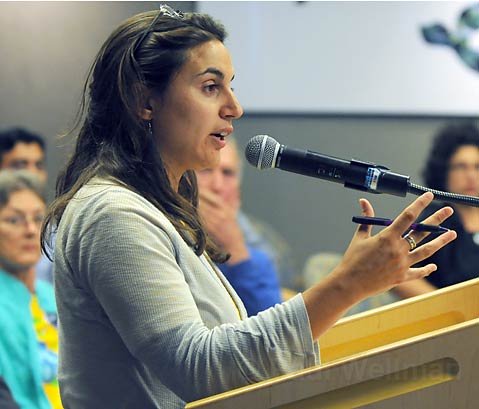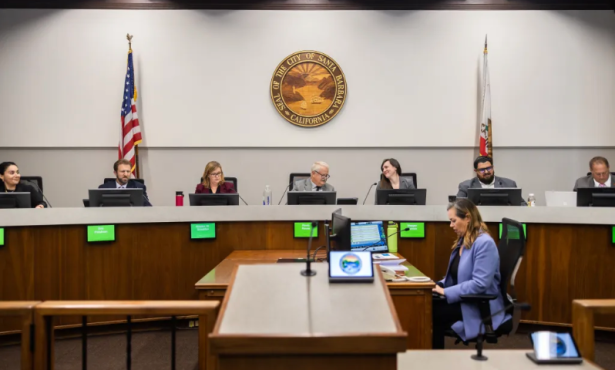Impound Policy Gets Second Look
Under Fire for 'Targeting' Illegals, Chief to Consider 20-Minute Grace Period

Santa Barbara Police Chief Cam Sanchez agreed to review how a handful of other California cities deal with impounding the cars of unlicensed drivers, after meeting with Santa Barbara Mayor Helene Schneider and community organizer Belen Seara of PUEBLO for 90 minutes in the mayor’s office last Monday. Seara and PUEBLO helped midwife a study—officially released during the week of Santa Barbara’s Fiesta celebration—that concluded that some Santa Barbara police officers had been “targeting” illegal immigrants for traffic stops and impounding their cars for driving without a license.
State law has barred illegal immigrants from obtaining licenses since 1994; it also requires police officers to impound the vehicles of unlicensed drivers or people who’ve had their license revoked. Barring certain exceptions, such impounds last 30 days. Typically, the cost associated with tow yard fees, tickets, and other expenses runs close to $2,000. This, said Seara, places an undue burden on many immigrants who find themselves caught in a very expensive legal Catch-22, because to economically survive, they all but have to drive.

Seara asked Sanchez to consider the approach taken by police authorities in San Francisco, Santa Rosa, Richmond, and Huntington Park, where department policy requires officers to give people stopped for driving without a license 20 minutes to get a licensed friend or relative to drive the car away. Sanchez agreed to look into the matter. “We’re going to look at the experience of these other cities and see if this is something we could do differently,” he said. Sanchez has vehemently denied that his officers target people based on ethnic origin, and said that as a matter of practice—though not policy—many of his officers already follow the 20-minute rule.
Seara said in other cities, the 20-minute rule helps both the cops and the people who might otherwise lose their cars. There, officers don’t have to wait around for 45 minutes to an hour for a tow truck to arrive, she said, and can get back on patrol sooner. Likewise, people who depend upon cars don’t find themselves forced to make do without.
The meeting was held at the invitation of Mayor Schneider who found herself caught in an email crossfire between Sanchez and Seara ever since Russ Trenholme, a retired businessman associated with PUEBLO, released his report criticizing the Santa Barbara Police Department for targeting illegal immigrants for traffic stops. All parties described the 90-minute meeting as “positive.” Sanchez took exception to the report, and repeatedly requested that Seara provide him the times, dates, and locations where targeting allegedly took place. If ethnic profiling was alleged, he wanted to know the details so he could investigate the charges.
Seara expressed reluctance to divulge such details, citing the legal vulnerability of the individuals involved. Seara also pressed Sanchez to change the way vehicle impounds are reported so that it’s clear why the cars were stopped in the first place, where the stop occurred, and what other citations, if any, were issued. “If officers are giving people 20 minutes, right now, it’s not reported anywhere,” Seara said. Such paperwork would also address some of the underlying skepticism expressed in the Trenholme report.
Trenholme found it more than a little suspicious that some officers dispatched to special traffic patrols impounded more than 50 percent of the cars they stopped, yet issued the fewest number of traffic citations. Presumably, such drivers exhibited some operational or mechanical problems that elicited the stop in the first place. “Why is it cops with 45 percent impound rates are issuing zero tickets?” Trenholme asked. “And why are the ones issuing the most traffic tickets impounding no cars?” Lacking evidence of probable cause, he contends ethnic targeting is taking place. Trenholme said the Police Department receives a $150 administrative fee for every impounded car that’s reclaimed. He added that driving without a license has become the department’s most frequently cited moving violation. Trenholme also said his review of police records indicates that four officers in particular are responsible for a disproportionate share of the impound citations.
Police officials cite statistics showing that unlicensed drivers are especially unsafe. One study indicates that unlicensed drivers are involved in one out of five traffic fatalities in California. Such studies do not distinguish, however, between drivers who’ve had their licenses revoked because of past driving violations and those who are simply legally ineligible to obtain a license. In past interviews, Sanchez said his officers were assigned to patrol neighborhoods based on hazardous traffic conditions, not the demographics of the residents.
Police spokesperson Paul McCaffrey said that 1,065 vehicles have been impounded in the city so far this year; 300 cars were towed because the driver had a suspended license, and 765 were taken away because the person had no license at all. An additional 79 people were either cited or arrested but their cars weren’t impounded, explained McCaffrey. This, he said, was either because a driver was operating a company car—which was then released to a licensed employee—or because a person’s license had expired less than 30 days before they were stopped.
Operating on the assumption that illegal immigrants will drive no matter what the law permits, a handful of states like Utah, New Mexico, and Oregon allow illegal immigrants to obtain drivers licenses. Both Sanchez and Seara agree this would be preferable; both conceded any changes in the state law will have to await a new governor. As former head of the California Police Chiefs Association, Sanchez once lobbied Governor Arnold Schwarzenegger on behalf of a bill authored by State Senator Gil Cedillo that would have permitted illegal immigrants driving privileges. “It’s not like we’d be giving them a party favor. They’d have to pass a driving test showing they know the rules of the road,” Sanchez said. “Common sense dictates that someone who’s demonstrated driving proficiency will be a safer driver.” Sanchez said Schwarzenegger rejected such arguments, contending that homeland security considerations were paramount. “We had a long discussion over cigars. He took my box of cigars, but that was not enough to bribe him because he vetoed the bill,” Sanchez joked.
Decidedly unamused in all this is Russ Trenholme—author of the study in question—who did not attend the meeting with Seara, Sanchez, and Schneider. Trenholme noted that he had yet to hear from Sanchez or anyone in the Police Department to discuss his evidence. The fact that four officers are issuing so many more vehicle impound citations than their colleagues should have raised red flags with Sanchez and their superiors, he claimed. “If someone’s impounding a large number of cars but not issuing any tickets, you’d think someone might check,” he said. Trenholme has amended his initial report, contending that many of the DUI checkpoints most frequently run by the department yield a surprisingly low number of DUIs, while generating a conspicuously high number of car impounds. This past weekend, for example, the police DUI checkpoint—run at several different intersections—netted only one DUI, but 21 vehicle impounds.



